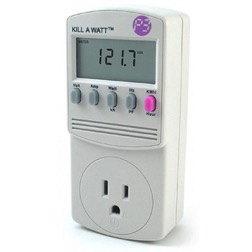Considering Your Max Load
 When you look at the aforementioned list, you can’t help but to notice the outliers. Several appliances soak up a disproportionate amount of juice. Central A/C, for example, requires more wattage than everything else on the list combined.
When you look at the aforementioned list, you can’t help but to notice the outliers. Several appliances soak up a disproportionate amount of juice. Central A/C, for example, requires more wattage than everything else on the list combined.
Still, there are others, such as your toaster or coffee maker that can really guzzle some power. These are the types of “sleepers” that use far more juice than you’d probably ever imagined. Sleepers can be a significant drain on your batter bank if you’re not careful. That’s why this power budgeting exercise is so important.
You absolutely must take an objective look at all of the appliances you’d like to power as you plan your system. Devices like the Killawatt (see nearby photo) can help you measure the electricity usage of your household appliances, and how much they use on different settings.
Top 5 Generators for Your Backup System
As it goes with all power equipment, there’s no shortage of opinions regarding why two nearly identical products are so vastly different… and why one is amazing and the other a useless piece of junk.
Suffice to say, the following selections and even the criteria are fairly subjective. As usual, we’ll explain our reasoning for these choices along the way.
Typically, the first choice you will need to make is how much power output do you truly need. Because our goal here is to create a backup plan, bigger is not better.
For example, a 10,000-Watt generator might power everything in your home at the same time, but it will drink through your gasoline so quickly that you’ll quickly need a backup plan for your backup plan.
That’s why we’ve limited our selections to models that produce roughly 2,000 watts. At that level, you can power a refrigerator/freezer combo, several ceiling fans, charge communications devices, and run your LED lighting — all at the same time. You could even run a window-unit AC if you wanted.
What’s more, a smaller energy footprint will come in handy during most backup energy situations. Backup batteries are expensive, so is running a generator 24 hours a day. Most likely, you’ll reduce and/or ration your reliance on electricity during a crisis for several reasons. One of these is, of course, that you’ll be extremely busy dealing with other concerns.
